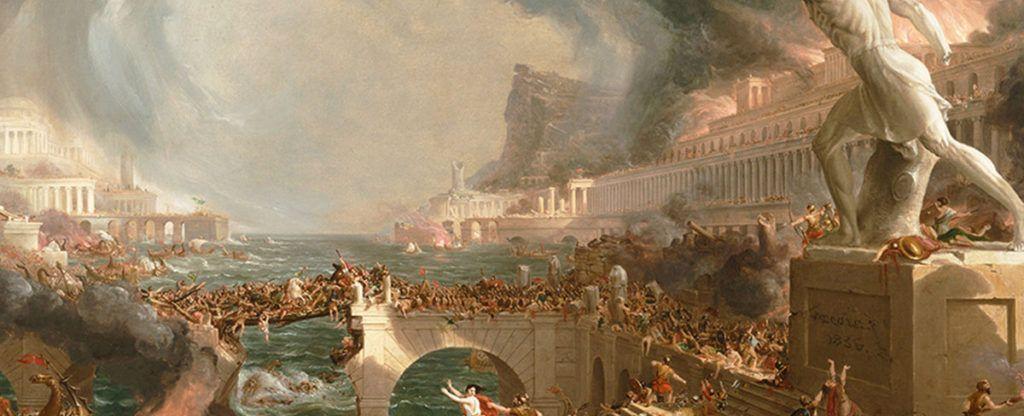"The Fire which Makes Gold Shine": On Benefiting from Calamity

This article does not take a firm stance on the question of whether the COVID-19 pandemic should be seen as a chastisement sent by God. If we were to follow John Henry Newman's lead, we would certainly have to remain open to that idea. In the Grammar of Assent, for instance, Newman contrasts orthodox Christian faith with "natural religion," the latter of which assumes "that the Creator does not punish except in the sense of correcting" and "that vengeance in [God] would of necessity be vindictiveness" (p. 416). In asserting that God does sometimes use natural events in order to punish human beings, Newman was following the lead of Sacred Scripture. Undoubtedly, there are interpretive complexities in handling biblical texts that speak of divinely ordained punishments, but on the surface holy writ presents certain wars and natural disasters as God's just judgment of sinful humanity.
If a great theologian like Newman and the Bible itself affirm this idea, why be reticent to identify a specific natural evil, such as this pandemic, as being permitted by God in order to chastise the wicked? Well, for a couple of reasons. First, our access to such knowledge is severely limited by virtue of our finitude. Persons of a religious bent are sometimes prone to assuming that we are uniquely privy to the designs of divine providence. However, different parts of the Bible highlight that human beings can be terribly mistaken in our judgements about such matters. In the Gospel of John, for instance, upon encountering a man who had been blind since birth, the disciples ask, "Rabbi, who sinned, this man or his parents, that he was born blind" (Jn 9:2)? But Jesus is quick to correct their erroneous assumption, responding, "Neither this man nor his parents sinned, but this happened so that the works of God might be displayed in him." The hasty conclusion that the pandemic is a punishment could rest on a similarly faulty premise. Maybe the inquiry, "Who sinned?" is the wrong question to begin with altogether.
Second, when it comes to conversation around COVID-19, it has been my experience that Christian commentators are far too ready to assume that the particular sin for which we are being punished is something "out there," something that others perpetrated, rather than the wrongdoings that weigh down our own community and personal lives. By way of example, a few prominent internet personalities have suggested that the coronavirus is God's punishment for Pope Francis's toleration of idolatry at the Amazon Synod. Without wading into the debate about whether or not what took place at the synod was idolatrous, it is telling that American Catholics have zeroed in on the veneration of an Amazonian statue as the reason God might have sent the pandemic as a chastisement, all the while saying next to nothing about the greed that permeates our social order. If affluent Americans truly do think the pandemic is a punishment from God for idolatry, then we should respond by repenting of our own forms of idolatry—preeminently, the enchantment of mammon. The New Testament is replete with warnings against an inordinate desire for wealth, and when Revelation 18 foretells the destruction of Babylon, the sins for which Babylon is punished bear a remarkable resemblance to the materialism and acquisitiveness that characterize modern-day American culture. This is the type of idolatry that constitutes a real temptation for us and for which we could legitimately incur God's wrath.
Moving away from speculation about whether the pandemic should be viewed as a chastisement, I would like to conclude with a question that I consider far more potentially fruitful—namely, what do we have to gain from passing through an experience like the one we are presently facing? In order to answer this question, I'm going to turn not to Newman, but to St. Augustine, who provides a lengthy treatment of this topic in book one of The City of God. In the wake of barbarian attacks against Rome, Augustine chides his fellow countrymen for being more concerned about their material wellbeing than the state of their souls. In response to the accusation that Rome was sacked because Christians failed to give due honor to the pagan gods, Augustine thunders, "You refuse to be held responsible for the evil that you do, while you hold the Christian era responsible for the evil which you suffer. You seek security not for the peace of your country but for your own impunity in debauchery" (bk I, ch 33).[i] In short, the Romans were sad to experience calamity not because it proved detrimental to the common good, but because it had deprived them of their former capacity to indulge their passions.
Consequently, the Romans forfeited a valuable opportunity to reform their sinful way of life. As Augustine memorably puts it, "Prosperity depraved you; and adversity could not reform you … You have learned no salutary lesson from calamity; you have become the most wretched, and you have remained the most worthless, of mankind" (bk I, ch 33.) Augustine argues that what is most important when we experience any trial, whether self-inflicted or seemingly random, is that we take advantage of such occasions to repent of our wrongdoings and reform our ways. "What matters," Augustine says, "is the nature of the sufferer, not the nature of the sufferings" (bk 1, ch 8). Expanding on this point, he writes,
"The fire which makes gold shine makes chaff smoke; the same flail breaks up the straw, and clears the grain; and oil is not mistaken for lees because both are forced out by the same press. In the same way, the violence which assails good men to test them, to cleanse and purify them, effects in the wicked their condemnation, ruin, and annihilation. Thus the wicked under pressure of affliction, execrate God and blaspheme; the good, in the same affliction, offer up prayers and praises." (bk 1, ch 8.)
Augustine's words present a helpful reminder in our present circumstances. Rather than getting bogged down in speculative arguments about how this or that event specifically fits into God's providential plan, we would do far better to use every difficulty that comes our way as an opportunity to grow morally and spiritually. Temporal sufferings will inevitably afflict us. The important question is: What use will we make of them when they do?
[i] Quotations from The City of God are taken from the translation by Henry Bettenson (New York: Penguin Books, 2003).
Share
Ryan Marr
Associate Provost at Mercy College of Health Sciences, Iowa
Ryan ("Bud") Marr Associate Provost at Mercy College of Health Sciences. He has served as the Director of NINS and Associate Editor of the Newman Studies Journal from 2017-2020. He is the author of To Be Perfect Is to Have Changed Often: The Development of John Henry Newman's Ecclesiological Outlook, 1845–1877 (Rowman & Littlefield, 2018), and has also contributed essays to Newman and Life in the Spirit (Fortress Press, 2014), Learning from All the Faithful (Pickwick, 2016), and The Oxford Handbook of John Henry Newman (Oxford University Press, 2018). His research interests include the life and writings of John Henry Newman, ecclesiology, and the reception of Vatican II.
Topics
Newsletter
QUICK LINKS

